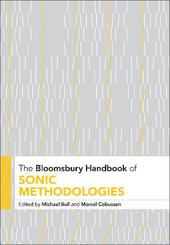
|
The Bloomsbury Handbook of Sonic Methodologies
Paperback / softback
Main Details
Description
The field of Sound Studies has changed and developed dramatically over the last two decades involving a vast and dizzying array of work produced by those working in the arts, social sciences and sciences. The study of sound is inherently interdisciplinary and is undertaken both by those who specialize in sound and by others who wish to include sound as an intrinsic and indispensable element in their research. This is the first resource to provide a wide ranging, cross-cultural and interdisciplinary investigation and analysis of the ways in which researchers use a broad range of methodologies in order to pursue their sonic investigations. It brings together 49 specially commissioned chapters that ask a wide range of questions including; how can sound be used in current academic disciplines? Is sound as a methodological tool indispensable for Sound Studies and what can sound artists contribute to the discourse on methodology in Sound Studies? The editors also present 3 original chapters that work as provocative 'sonic methodological interventions' prefacing the 3 sections of the book.
Author Biography
Michael Bull is Professor of Sound Studies at the University of Sussex, UK. He is series editor of the Study of Sound series with Bloomsbury and author of the book in the series, Sirens (2020). He is a founding editor of the Senses and Society Journal and the Sound Studies Journal and is author of numerous academic books including, Sound Moves (2007), Sounding Out the City (Bloomsbury, 2000) and editor of the Routledge Companion to Sound Studies (2018). Marcel Cobussen is Professor of Auditory Culture at Leiden University, the Netherlands. He is author of Engaging With Everyday Sounds (2022), The Field of Musical Improvisation (2017), Thresholds: Rethinking Spirituality through Music (2008), and co-editor of The Routledge Companion to Sounding Art (2016).
ReviewsSound studies is a disruptor. Sound cuts across the arts, sciences, engineering, history and the academy, reconfiguring things as it goes along. Its only rule is that it's about the sound. This means its methods are as varied as can be and are often pitched as anti-methods. This vast methodological smorgasbord is like a sound walk. You hear echoes of standard methodologies from ethnomusicology, sound art and cultural and science studies and places like the exhibition, the archive, the studio and the field and you learn about new methods finely tuned to sound. The book and the editorial vignettes, set in a fascinating dialogical form because of the pandemic, are always smart and reflective. If you want to learn to think systematically about how sound is studied this is the place to begin your journey. * Trevor Pinch, pioneer in sound studies and Goldwin Smith Professor of Science and Technology Studies, Cornell University, USA * From music to geography, historical debate to epistemological arguments, the study of sound finds footing within a compelling range of academic and artistic contexts. The Bloomsbury Handbook of Sonic Methodologies offers a comprehensive, situated and deeply enriching view onto such diversity, capturing how researchers and practitioners approach sound as a topic and material. Such a compendium affords greater understanding of sound as the basis for a radical transdisciplinarity. * Brandon LaBelle, Professor, Art Academy, University of Bergen, Norway, and author of Acoustic Justice (Bloomsbury, 2021) *
|